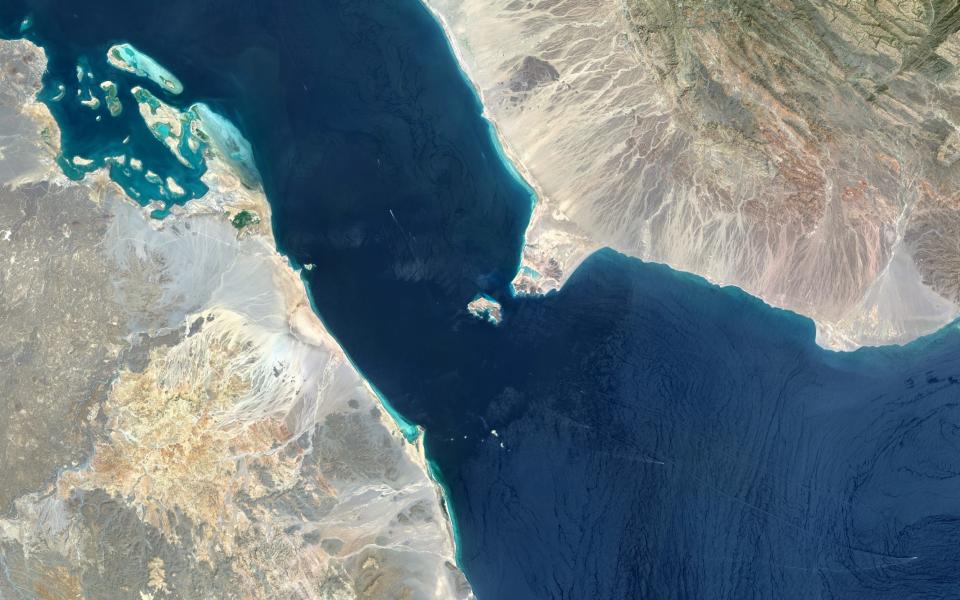Drivers face petrol price hike as Shell suspends Red Sea shipments

Shell has suspended all Red Sea shipments indefinitely in a move that threatens a fresh spike in petrol prices for drivers at the pump.
Wael Sawan, chief executive of Shell, said the company had a dedicated team monitoring the crucial shipping route on a “minute-by-minute” basis after the US and UK carried out counter strikes on Houthi targets in Yemen last week.
The oil and gas giant has halted all crossings over safety concerns that further escalation could place vessels at risk, the Wall Street Journal reported. It is also understood to be worried that a successful attack could trigger an oil spill in the region.
Shell’s decision to suspend shipments comes amid growing concerns that the disruption could spark a renewed surge in inflation.
Charlie Nunn, chief executive of Lloyds Bank, warned the conflict was a threat to the UK economy.
Mr Nunn told Bloomberg TV: “The challenge is the uncertainty geopolitically, which would come back on the UK more in second order consequences through energy prices, or the supply chain costs increasing, and so we’re watching very carefully as to what’s going on in the Middle East, in Ukraine and further elections around the world.”
Caroline Bain, chief commodities economist at Capital Economics, added: “It could eventually push up the price of petroleum products as refineries will have to pay higher shipping costs.”
Oil products include petrol, diesel, heating oil, jet fuel and naphtha. The price of Brent crude was steady at $78 on Tuesday, with analysts saying that while deliveries will be slower, there has been no disruption to oil production.
Speaking on the sidelines of the World Economic Forum in Davos, Switzerland, Mr Sawan said diverting ships around the Red Sea was pushing shipping costs up by as much as 10pc.
He said: “Something like a Red Sea closure is taking an extra couple of weeks to be able to move a cargo around.
“What we see in general, is a 5pc to 10pc bump up in overall cost of delivered goods... because of the extra distance you have to sail. But also the fact that the broader shipping fleet is now trying to figure out exactly what you do.
“The team monitors this on a daily basis, if not a minutely basis.”
Oil tanker companies including QatarEnergy, Torm and BP have all halted activity through the Red Sea since the Houthi rebels began attacks on vessels in mid-December. The Iran-backed Houthis are carrying out the attacks in response to Israel’s war on Gaza.
Financial markets have been ramping up bets on a string of interest rate cuts by the Bank of England this year as inflation cools rapidly from its peak of 11pc in 2022 to 3.9pc in November.
Traders have priced in the first Bank of England cuts from May, while analysts have forecast a further drop in inflation when the December data is published on Wednesday.
However, Gita Gopinath, deputy managing director of the International Monetary Fund (IMF), warned against “exuberant” bets on aggressive central bank interest rate cuts.
Speaking at Davos on Tuesday she said: “The markets are expecting central banks to cut rates pretty aggressively. I think that’s a bit premature. We should expect rates to come down some time this year but … we expect this to be more likely in the second half of this year.”
Ms Gopinath also criticised rampant money-printing schemes, such as those deployed by the Bank of England and Federal Reserve during the pandemic, that meant governments were now seen as the “insurer of first resort” by businesses and households.
She added that policymakers should be more “wary” of using so-called quantitative easing in the future because they had used it a “little bit too liberally” in the past.
On Tuesday night, the board of BP was meeting to finalise the appointment of Murray Auchincloss as its permanent chief executive, according to Sky News.
Mr Auchincloss was given the role on an interim basis in September after the incumbent, Bernard Looney, was forced to resign after accepting that he had not been “fully transparent” about personal relationships with company colleagues.
Mr Auchincloss, a chartered financial analyst, joined Amoco in 1992, which later merged with BP.
The Telegraph approached BP for comment.
Separately, the trade minister Nusrat Ghani said the UK is ramping up plans to boost investment in Cornwall’s lithium mining sector in an effort to increase Britain’s “self-sufficiency” amid the Red Sea disruption.
Ms Ghani singled out the South West’s potential as a source for the crucial metal, which is in growing demand as a battery component for electric vehicles.
Britain is currently reliant on lithium supplies from countries such as China and Australia, which have proven vulnerable to global shocks.
The lithium plans are part of a wider new critical imports and supply chain strategy, under which the Government will map out complex supply chains and monitor threats to vital products.
This includes medicines and semiconductors, where the vulnerability of supplies was highlighted in the pandemic as ships struggled to get in and out of ports.

 Yahoo Finance
Yahoo Finance 